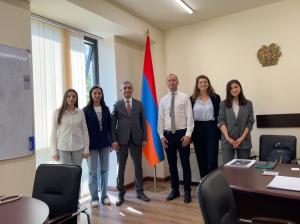
As part of UNECE’s effort to support innovation-led, sustainable development in Armenia, UNECE’s Innovative Policies Development (IPDS) makes progress in identifying binding constraints to innovation during a fact-finding mission to Yerevan.
Aimed at providing a comprehensive assessment of Armenia’s progress on national innovation governance, the Innovation for Sustainable Development Review (I4SDR) will also include two elective chapters, selected in consultation with three line ministries: diaspora engagement for innovation in the agricultural sector and building effective innovation infrastructure.
Armenia has made substantial progress in developing a competitive economy and growing its information and communication technology (ICT) sector. This emerging pocket of innovation excellence, complemented by vibrant tourism, mining, and food processing industries, as well as an entrepreneurial business climate are a testament to Armenia’s successes. As per recent World Bank analyses, the country’s recent prudent macroeconomic policies, including inflation targeting, robust fiscal rule, pro-competition reforms, and democratic governance have contributed to this success and helped the country to weather the resent crises. The government’s support for technological and scientific progress has, in turn, contributed to transforming Armenia into an international leader in ICT service exporting.
Building on these achievements, Armenia remains committed to further improving its innovation governance to achieve its full potential. The aim of the I4SDR is, therefore, to guide its innovation policy in the coming years, and support the country’s progress by mitigating the economic and social consequences of the COVID19 pandemic and the ongoing geopolitical instability, and bolstering trade, and competitiveness.
Armenia’s commitment to innovation is evident from the wide variety of stakeholders that have participated in consultations with UNECE. From government stakeholders and international organisations to academics and researchers to NGOs, private-sector actors, and diaspora companies, UNECE was able to meet with more than 100 stakeholders for roundtable discussions.
Highlights included in depth exchanges on Armenia’s reform needs with the President of the Academy of Sciences, the Chairman of the Science Committee, the President of the Chamber of Commerce, and the Deputy Minister for High Tech Industry. Another meeting gathered representatives of diaspora-founded start-ups and companies for an open discussion on government support programmes and strategy of diaspora engagement.
During these consultations, several hypotheses and overarching priorities for improving innovation governance emerged:
- Building on the improvements in government transparency and efficiency in recent years, Armenia should develop an overarching innovation strategy to mainstream innovation into the work of all ministries and agencies;
- Building on the success of an online platform for feedback and coordination of strategies, inter-governmental coordination could be improved further by reducing overlaps in mandates across ministries;
- The evidence base for innovation policy could be improved further by improving the systematic collection of statistics on innovation.
Several of these issues were previously touched upon in the Eastern Europe and South Caucasus Innovation Policy Outlook (IPO, 2020) which provided an assessment of innovation in multiple economies in the Eastern Europe and South Caucasus region. While the recommendations from the IPO have already influenced national policies on innovation and produced tangible changes, the review process illustrates that more work remains to be done.
The I4SDR will study each of these issues and many more in depth and will develop a roadmap and capacity building programme to tackle them head on. The roadmap will identify innovation policy priorities for Armenia in the coming years and serve to shape strategic documents, including the new digitalisation strategy. As evident from the success of the fact-finding mission, the Armenian government stands ready to act on these recommendations and remains committed to the goal of achieving innovation-driven sustainable development, which will also contribute to a more circular economy and the digital and green transformations.

